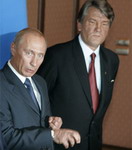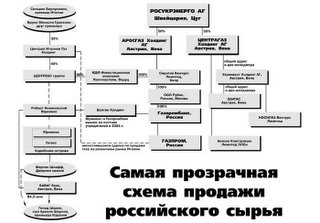Back in autumn of 2005, Yanukovich and Timoshenko reached an agreement on
everything with the Kremlin. By February of 2006, the gas crisis had to reach its apogee including empty underground reservoirs, dead plants and mines, infuriated
Ukrainian people and fuel Maidan brandishing pieces of the sacred gas pipeline. At that moment opposition leaders had to come to the stage undertaking a high intermediary mission and reaching a happy agreement on everything. This meant
that they would win the parliamentary elections scheduled for March 26 easily.
Whereas Yanukovich claimed mostly political mediation Timoshenko was also going to become a gas master establishing a new market operator to replace RosUkrEnergo that had grown old. In alliance with semi-forgotten ITERA (this company was allied with former CEO of Gazprom Rem Vyakhirev and had friendly relations with Timoshenko back in the mid-1990s when the future orange princess was head of the trader company United Energy Systems of Ukraine) the former Prime Minister of Ukraine was going to supply Central Asian gas to Ukraine at
$115-120. The generous Kremlin promised to arrange reliable transit. This was not incidental that all criminal proceedings were dropped when the gas crisis was in full swing because there was no need for legal actions anymore.
So not only are there allegations about Yuschenko's brother but there are also allegations about Tymoshenko and the gas deal. It is important however to remember that these are allegations that must be proven.
Politics is a dirty business here in Ukraine as it is in Russia. Anything is possible and any kind of evidence may surface against anyone and anything has been used here to influence politicians up to and including murder. (Ukrainian politicians have had the highest rate of automobile deaths in the world--a for instance. Explanation? An expertise on the part of the security services in car accidents. Would apply to retirees and moonlighters. "Situation Wanted: Have car, will travel.") So about anything is possible.
So why do we include these allegations here? Because they do have an affect on the political atmosphere here at the very least and they can end up influencing policies and elections even if they later prove to be untrue. So they are important in their own right. But they should be taken with a degree of skepticism until they are proven. And that might take some time here given the political nature of the courts. (The passage of time without any further information coming out is an indicator now that the press is free.)
Of course they might end up being true too. And some are more credible than others are. But we'll wait for the evidence before saying anything definitive about it.




